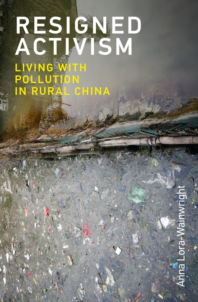
By Mariko Karlsson.
If “cancer villages” and pollution related deaths are common in China, it’s not due to ignorance – but due to the lack of power. Political ecologists at a recent roundtable event on struggles for environmental justice in China could agree on that.
EnvJustice researcher Dr Juan Liu explained how migrants mine workers have less social protections, are forced to take higher risks and often catch a “miner’s lung” She also argues there are links between pneumoconiosis (the doctor’s word for miners’s lung) and the production of many types of commodities consumed by people in their daily life, leading to ethical questions on consumer society.
Professor Ajiang Chen from Hohai University in Nanjing, an authority on cancer villages, told about the long-term side-effects of historical floodings of both the Yellow and Huai rivers. He argued that paddy cultivation system changes cause pollution of drinking water, which in its turn has been linked to incidents of cancer in local residents. Through this historical perspective he was able to explain a causal relationship between long term water cycle changes and widespread disease.
Professor Anna Lora-Wainwright from the University of Oxford presented her new book “Resigned Activism: living with pollution in rural China” (MIT Press, 2017). Anna is a member of EnvJustice’s advisory board. After looking into the phosphorous industry, lead mining and recycling of e-waste she challenges the idea that rural communities in China are ignorant of the detrimental health impacts pollution might have on them and instead suggests that the reasons behind the apparent low levels of political resistance are more nuanced, complex and related to questions of power.
More Information
The roundtable on the Political Ecology of China was organised by the EnvJustice project on 28 November 2017 at ICTA UAB
Topics and Speakers:
Resigned activism and environmental politics in contemporary China. Prof. Anna Lora-Wainwright, Associate Professor in the Human Geography of China, University of Oxford.
Environmental Evolution and Health Risks. Prof. Ajiang Chen, Research Centre of Environment and Society, Hohai University, Nanjing, China
Understanding the environment-health-poverty complex in rural China through the lens of pneumoconiosis. Dr. Juan Liu, EnvJustice Project, ICTA, UAB
Professor Ajiang CHEN was born in 1963. He obtained his PhD degree in sociology in 1997 from the Graduate School of Chinese Academy of Social Sciences. He is the dean of the Department of Sociology, the director of the Research Centre of Environment and Society at Hohai University, Nanjing, and the Chairman of the Committee of Environmental Sociology in Chinese Sociology Association. His main research interests are environmental sociology and the development of rural areas. He conducted many research projects, including “Environmental Behaviour and Non-point Source Water Pollution Study (2012–2017)”and “Water-Human Relationship Study (2007-2010)”, sponsored by National Social Science Foundation. He has published series of books including: Domestic Waste Management in Urban China: Challenges and Solutions (2016), The Investigation on “Cancer Villages” (2013), The Secondary Anxiety: A Sociological Study on the Water Pollution in Tai Lake (2010) and Institutional Innovation and Area Development (2000). He is also the (co)author of over 50 articles mainly in Chinese journals.
Professor Anna Lora-Wainright, member of the Advisory Board of the EnvJustice project. Associate Professor in the Human Geography of China, School of Interdisciplinary Area Studies, University of Oxford. She has a PhD in Anthropology from Oxford University; an MA in Chinese Studies and a BA in Anthropology, both from the School of Oriental and African Studies, London. Since 2004, Anna has carried out over 2 years of fieldwork in rural China on various aspects of villagers’ experiences and understandings of health. Her first monograph Fighting for Breath: Living Morally and Dying of Cancer in a Sichuan Village (2013, University of Hawai’i Press) is the first book-length ethnography to offer a bottom-up account of how families strive to make sense of cancer and care for sufferers in contemporary rural China. Her second monograph, Resigned Activism: Living with Pollution in Rural China (2017, MIT Press) draws on fieldwork in three sites and on a close analysis of Ajiang Chen’s work on ‘cancer villages’ to examine the complex spectrum of local responses to pollution. Anna also edited a special collection for The China Quarterly on ‘Dying for Development: Pollution, Illness and the Limits of Citizens’ Agency in China’ (2013) and co-edited a special section of the journal AREA on ‘Peering Through Loopholes, Tracing Conversions: Remapping the Transborder Trade in Electronic Waste’ (2015, with Peter Wynn Kirby).
Juan Liu holds a PhD in development studies from China Agricultural University, and has been a postdoc at The International Institute of Social Studies (ISS), The Hague. Her research interests and publications include: internal migration and left-behind population, social policies, rural politics, land politics, and political economy of agriculture, food and environment. She is assistant professor at College of Humanities and Social Development, Northwest A&F University, China, and she is in the global secretariat of the BRICS Initiatives for Critical Agrarian Studies (BICAS) and is co-editor of the BICAS Working Paper Series. At ICTA−UAB, she will research on changes in the social metabolism of China and the impacts on the natural environment and society.

The project ENVJUSTICE has received funding from the European Research Council (ERC) under the European Union’s Horizon 2020 research and innovation programme (grant agreement No. 695446)